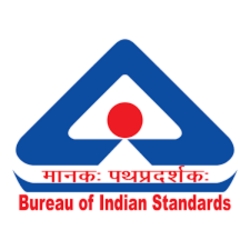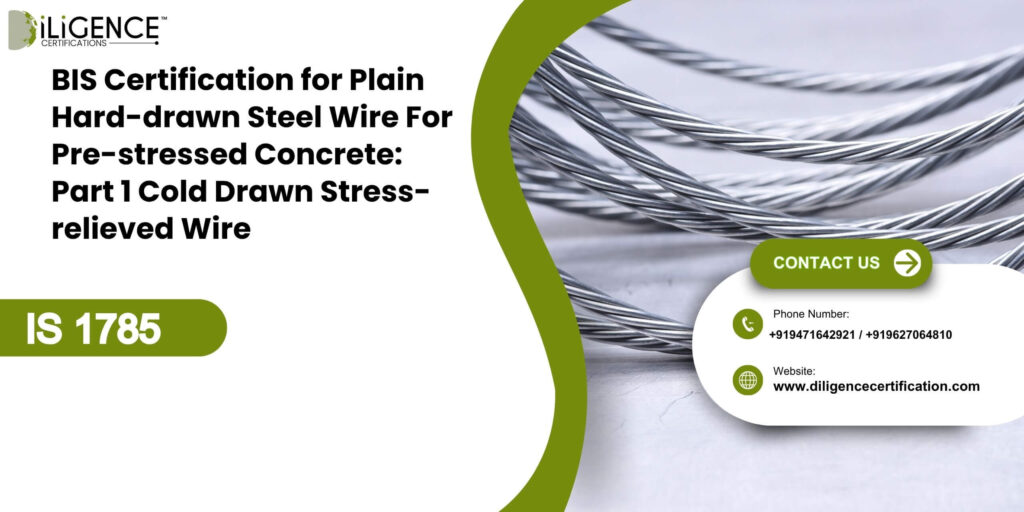- BIS certification under IS 1785 (Part 1): 1983 ensures the quality and safety of Hard-drawn Steel Wire.
- It is mandatory for manufacturing, import, and sale in India.
- The standard defines limits for composition, strength, and dimensions.
- Certification involves documentation, testing, and BIS inspection.
- BIS-approved wires gain higher market trust and project acceptance.
Introduction

A major steel wire manufacturer was once turned away by a significant construction company because their product did not have the BIS certification to IS 1785 (Part 1):1983. This project specifically requested cold drawn stress-relieved wire that had BIS approval for pre-stressed concrete use. Cases like these exemplify how the market has shifted towards making certification a requirement for market access and customer confidence. Having a BIS certification is guaranteed to mean that every wire has met the strength, durability, and performance standards that were needed. For manufacturers and importers, it is seen as an obligation for compliance and as a symbol of technical reliability. Bureau of Indian Standards
What is IS 1785 (Part 1):1983?
IS 1785 (Part 1):1983 outlines the specifications for plain hard-drawn, cold drawn stress relieved steel wire for use in pre-stressed concrete. This standard outlines the necessary strength, ductility and uniformity of wire to meet safety and structural integrity.
Key Points:

- Provides limits on the chemical composition of the steel.
- Defines tensile strength, proof stress, and elongation limits.
- Addresses dimensional tolerances and allowable variations.
- Addresses the approach to testing mechanical and physical properties.
- Establish uniform quality of construction and infrastructure projects. ISI MARK
Why is BIS Certification Mandatory
BIS certification for plain hard-drawn steel wire under IS 1785 (Part 1):1983 is mandatory to ensure product safety, quality, and compliance with national standards used in critical construction works.
Key Points:
- Ensures wires meet mechanical and chemical standards for pre-stressed concrete.
- Mandatory under the Steel and Steel Products (Quality Control) Order issued by the Government of India.
- Protects end-users and builders from structural failures or poor-quality materials.
- Required for legal manufacturing, import, and sale in the Indian market.
- Builds credibility with clients and allows participation in government and infrastructure tenders.
Importance & Benefits of BIS Certification
| Importance | Benefits |
| Ensures manufacturing follows IS 1785 (Part 1):1983 for chemical composition, strength, and dimensional accuracy. | Guarantees high-quality steel wire suitable for pre-stressed concrete and critical infrastructure. |
| Mandatory under the Steel and Steel Products (Quality Control) Order for legal market sale. | Allows participation in government and large construction tenders requiring BIS-approved materials. |
| Maintains safety and structural integrity in bridges, beams, and railway sleepers. | Reduces chances of structural failure and costly rejections. |
| Promotes standardization and uniformity across steel wire manufacturers. | Builds long-term credibility and trust among clients and contractors. |
| Supports India’s quality assurance framework and global trade compliance. | Improves brand reputation and opens export opportunities. |
Step by Step process of BIS Certification

Step1:Documentation
- Collect company and factory licenses
- Prepare technical drawings and product details
- Maintain quality control records
- Gather test equipment calibration certificates
Step2:Product Testing
- Test samples in BIS-approved labs
- Follow IS 1785 (Part 1):1983 parameters
- Record tensile, chemical, and dimensional results
- Resolve any test non-conformities
Step3:Application Submission
- Apply online through the BIS portal
- Upload all supporting documents and test reports
- Pay government fees
- Keep acknowledgement for tracking
Step4:Scrutiny and Inspection
- BIS officials review documents and visit the factory
- Verify production setup and lab facilities
- Check material traceability and QC systems
- Address queries or corrections quickly
Step5:Grant of Licence
- Receive BIS licence after approval
- Start marking products with the ISI logo
- Maintain test and production records regularly
- Renew and comply with BIS surveillance audits
Documents Required for BIS Certification
| Document Type | Details Required |
| Company Documents | Incorporation/Registration, GST, Factory Licence |
| Manufacturing Details | Process flow chart, machinery list, production capacity |
| Product Information | Technical specifications, drawings, raw material details |
| Quality Control Records | QC plan, testing frequency, equipment calibration proof |
| Test Reports | From BIS/NABL-approved lab as per IS 1785 (Part 1):1983 |
| Authorized Signatory Proof | ID proof, authorization letter, signature sample |
| Factory Layout | Floor plan showing production and testing areas |
| Trademark/Brand Proof | Copy of brand registration or authorization (if applicable) |
Timelines, Costs, Validity & Renewal
- Timeline: Usually completed within 30 – 45 days depending on the timing of inspections or testing.
- Cost: Cost is the application fee, plus the relevant testing and inspection fees; the cost can vary by product.
- Validity: Licence remains valid for 2 years from issue date.
- Renewal: Can be renewed up to 5 years with updated reports and fees.
Why choose Diligence Certifications
At Diligence Certifications, we are qualified professionals that guarantee effortless and accurate BIS certification. The process ensures you that every step is taken to ensure the utmost professionalism, from the documentation process to the final certification approval process.
- We have seasoned experts with thorough knowledge and expertise with the BIS and IS 1785 (Part 1):1983 standards.
- Complete support from product testing to inspection coordination.
- Faster turnaround through pre-audit checks and document accuracy.
- Strong network with BIS-recognized labs for reliable test results.
- Continued assistance for renewals, modifications, and post-licence compliance.
Conclusion
The BIS Certification of Plain Hard-drawn Steel Wire for Pre-stressed Concrete: Part 1 Cold Drawn Stress-relieved Wire under IS 1785 (Part 1):1983 gives the highest assurance of quality, safety, and regulatory compliance for any structural construction building material. It proves that each wire is built to India’s structural code and performance characteristics. For manufacturers and importers, this will provide you with instant credibility, access to the market, and beneficiaries can have the confidence of working with material of assured quality. Working with experts, like Diligence Certifications, is a quicker, compliant, and pain-free way to assure that your product meets every benchmark of compliance and performance with confidence.
Frequently Ask Questions
What is the significance of IS 1785 (Part 1): 1983?
This is a standard that specifies characteristics of the plain hard drawn, cold drawn stress relieved steel wire, which is to be used in pre-stressed concrete, in order to ensure different levels of consistency and performance.
Is BIS certification mandatory for the manufacturers of steel wire items?
Yes, BIS certification is mandatory to manufacture, import or sell items, whether it be a defined standard under the Steel and Steel products (Quality Control) Order in India.
Who to contact for BIS certification in India?
Once the raw material testing has been completed, relevant documentation has been examined, issuance of the certification has taken place and a factory inspection has been carried out, then the Bureau of Indian Standards (BIS) will provide BIS certification in India.
What are the mandatory essential tests conducted on the article?
The following tests are made part of the certification to be provided: tensile strength, proof stress, elongation, chemical composition, and dimensions, as outlined in IS 1785 (Part 1): 1983.
What are the usual time frames for the certification under BIS?
The timeframe for the BIS certification is, on average, about 30 to 45 working days, with possible variation in processing relevant testing laboratory follow-ups and inspection scheduling.
What documentation do I need to complete in order to pursue the BIS certificate?
The application for certification needs to contain all the required key documentation related to their business; including registration of the company, description of product, quality control procedure document, documented templates for test reporting, and evidence, if applicable, that Operating Procedures and Training Plans has been established.
What is the validity period of BIS certification?
The BIS licence remains valid for two years and can be renewed for up to five years with updated test reports and compliance proof.
Can foreign manufacturers apply for BIS certification?
Yes, foreign manufacturers can apply under the FMCS (Foreign Manufacturers Certification Scheme) through an Indian Authorized Representative.
What are the benefits of obtaining BIS certification?
It enhances credibility, ensures compliance, improves market acceptance, and allows participation in major infrastructure and government projects.
How can Diligence Certifications help in the BIS process?
Diligence Certifications provides complete assistance — from documentation and testing coordination to inspection support and licence renewal — ensuring faster, compliant certification.








 BIS Certification
BIS Certification
 CDSCO
CDSCO
 CPCB
CPCB
 LMPC
LMPC
 WPC Approval
WPC Approval
 Global Approvals
Global Approvals
 TEC
TEC
 ARAI
ARAI
 BEE
BEE
 ISO Certification
ISO Certification
 DGCA Certification
DGCA Certification
 NOC For Steel
NOC For Steel



















 Business Registration
Business Registration















 Legal Services
Legal Services
 Trademark Registration
Trademark Registration
 Copyright Registration
Copyright Registration
 Patent Registration
Patent Registration















































